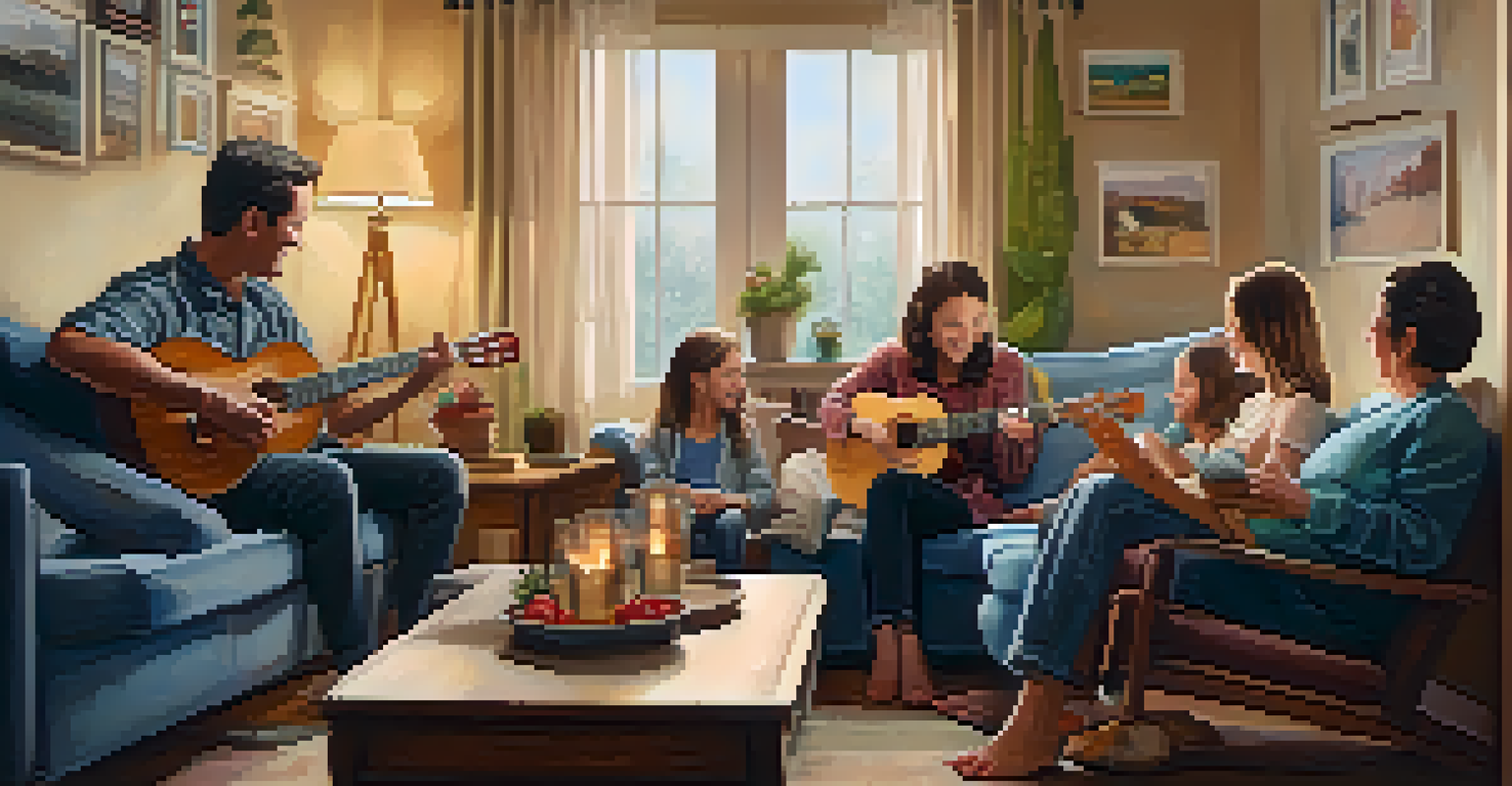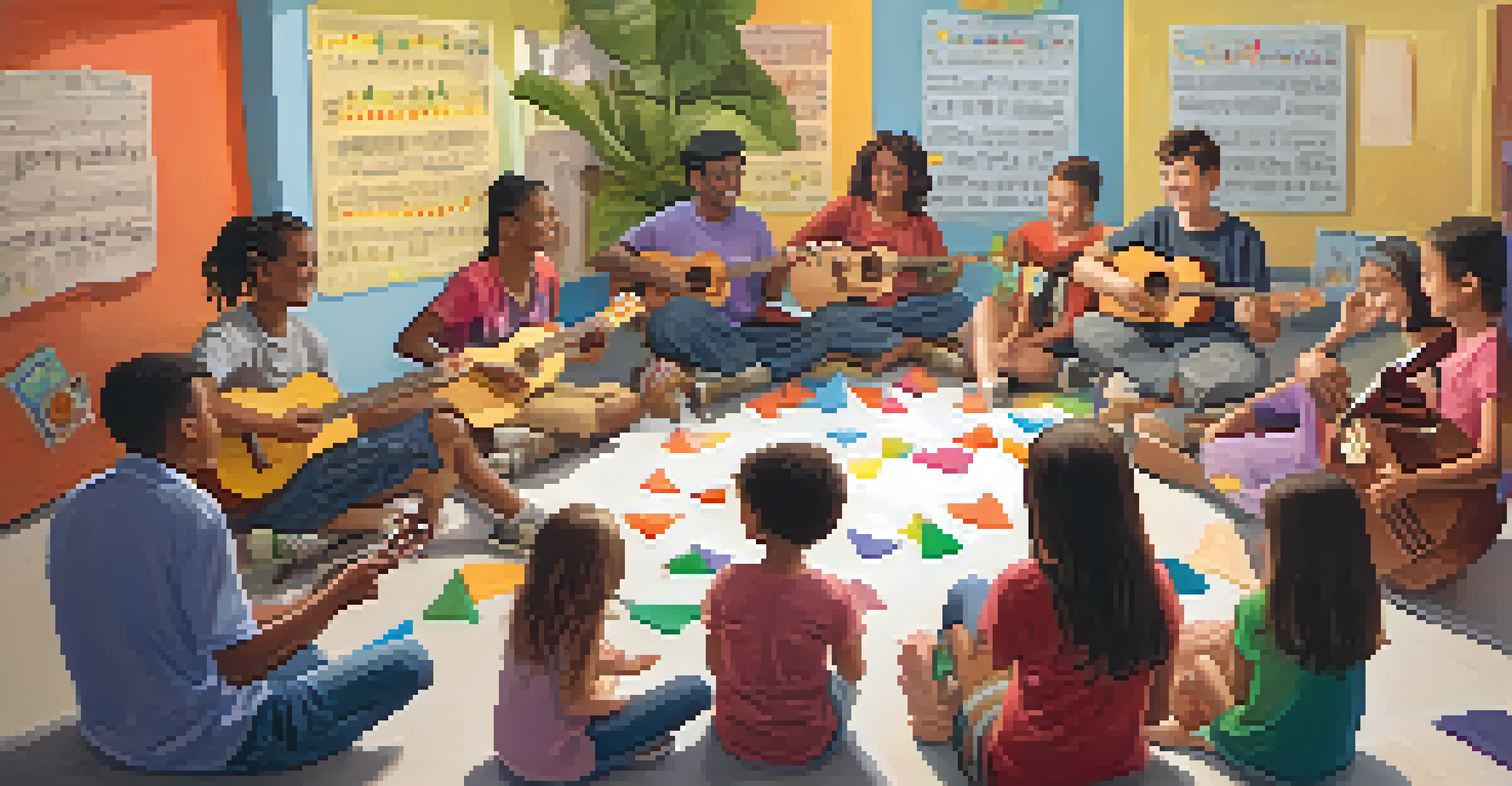The Ukulele: A Unique Bonding Tool for Friends and Strangers

The Ukulele: A Brief Introduction to Its Charm
The ukulele, often dubbed the 'jumping flea,' is a small, four-stringed instrument that originated in Hawaii. Its cheerful sound and portability make it an ideal companion for anyone, whether you're a seasoned musician or a complete beginner. Unlike some instruments that can seem daunting, the ukulele invites you to pick it up and start playing almost immediately. This accessibility is part of what makes it so special and a great bonding tool.
Music can change the world because it can change people.
Imagine sitting on a beach, strumming a few chords, and suddenly, you're surrounded by friends, old and new, all singing along. The ukulele creates a warm atmosphere that encourages people to connect, laugh, and share stories. It’s not just about making music; it’s about creating memories and fostering relationships that can last a lifetime. This instrument transcends barriers, allowing people from diverse backgrounds to come together.
Whether it's at a party, a campfire, or even a casual gathering, the ukulele can serve as a conversation starter. Its playful nature often brings out the child in all of us, breaking down the walls of formality and encouraging people to let loose. In this way, the ukulele acts as a bridge, uniting friends and strangers alike through the universal language of music.
Learning Together: The Joy of Group Ukulele Sessions
One of the most delightful aspects of the ukulele is that it’s often played in groups. Group ukulele sessions can turn into spontaneous jam sessions, where everyone contributes their unique flair. This collaborative spirit not only enhances the music but also strengthens bonds among participants. It's amazing how a simple chord progression can bring people together, creating a sense of community and shared experience.

In these sessions, everyone has the chance to share their favorite songs, learn new techniques, and even teach each other. The atmosphere is usually filled with laughter, encouragement, and a bit of friendly competition. As individuals take turns leading the group, they find themselves not just playing music but also weaving their personal stories into the fabric of the gathering. It’s a beautiful reminder of how music can connect us all.
Ukulele: A Social Bridge
The ukulele fosters connections by bringing people together through its cheerful sound and accessibility.
Moreover, learning to play the ukulele in a group fosters a sense of accountability. When you know your friends are counting on you to practice and show up, it motivates you to improve. This shared commitment can deepen friendships and even spark new ones, as you cheer each other on and celebrate milestones together. The ukulele, in this sense, becomes more than just an instrument; it’s a catalyst for growth and connection.
Strumming Away Differences: The Ukulele as a Connector
The beauty of the ukulele lies in its ability to bridge cultural and social divides. People from different backgrounds can come together and find common ground through this simple instrument. Whether you’re jamming with a neighbor or strumming alongside travelers in a foreign country, the ukulele fosters a sense of belonging. It’s a reminder that, at our core, we all share a love for music and connection.
Where words fail, music speaks.
For instance, consider a community event where people of all ages and backgrounds gather to play the ukulele. In these moments, differences in language, age, or even musical preferences fade away. Participants might find themselves singing the same songs, laughing at the same jokes, and sharing in the joy of making music together. This unifying experience highlights the power of the ukulele as a tool for connection and friendship.
Additionally, the ukulele's simplicity makes it accessible to everyone, regardless of their musical background. This inclusivity invites participation from all walks of life, making it easier for strangers to bond over a shared love of music. By embracing the ukulele, we embrace the idea that music can be a universal language, one that fosters understanding and camaraderie among all people.
The Therapeutic Power of Ukulele Playing
Playing the ukulele has been shown to have numerous mental health benefits, making it a fantastic tool for fostering connections. Engaging in music can reduce stress and anxiety, promoting a sense of calm and well-being. When friends gather to strum and sing, they create a supportive environment where everyone can unwind and express themselves. This therapeutic aspect enhances their bonds, as they share not just music, but also feelings and experiences.
Moreover, the act of making music together can evoke nostalgia and positive memories, further strengthening friendships. Whether it’s playing a song that reminds you of high school or a tune that sparks a cherished memory, these shared experiences can deepen connections. The ukulele becomes a vessel for storytelling, allowing friends to reminisce while creating new memories in the process.
Group Sessions Enhance Bonds
Playing the ukulele in groups promotes collaboration, accountability, and deepens friendships among participants.
In group settings, the ukulele can also serve as a form of social therapy, where participants share their challenges and support one another through music. This collective experience of vulnerability and support can create lasting friendships, as individuals find solace in knowing they are not alone. The ukulele, therefore, is not just an instrument; it’s a path to healing and connection.
Creating Lasting Memories Through Ukulele Events
Organizing ukulele events can be a fantastic way to bring people together and create unforgettable memories. Whether it’s a casual backyard gathering or a more formal concert, these events create an environment where laughter, music, and joy can flourish. Attendees often leave with not just a few new songs in their repertoire but also new friends and cherished experiences. The simple act of sharing music can foster connections that extend beyond the event itself.
Think about how memorable it can be to participate in a ukulele workshop or a themed jam night. These gatherings often inspire creativity and collaboration, as participants are encouraged to share their styles and interpretations. The shared excitement of learning something new can energize the group, leaving everyone feeling uplifted and connected. It’s these kinds of experiences that often become the stories we share for years to come.
Additionally, hosting a ukulele event can create a sense of community pride. Local musicians can come together to showcase their talents while inviting others to join in the fun. This sense of belonging can motivate individuals to continue playing and learning, fostering a love for music that can last a lifetime. In this way, the ukulele serves as a catalyst for community engagement and lasting friendships.
The Ukulele in Everyday Life: A Tool for Connection
The magic of the ukulele extends beyond formal gatherings; it can be a delightful addition to everyday life. Whether you’re playing it at a family gathering, a picnic, or just in your living room, the ukulele can effortlessly spark conversations and create connections. The act of playing together can transform mundane moments into memorable experiences, enhancing relationships with family and friends.
For instance, consider a family reunion where everyone brings their ukulele. As family members strum and sing together, they share stories, laughter, and a sense of nostalgia. It’s a beautiful way to honor family traditions while also creating new ones. The ukulele, in this context, becomes a tool for connection that bridges generations, allowing older and younger family members to bond over music.
Music as a Healing Tool
Engaging in ukulele playing offers therapeutic benefits, helping to reduce stress and create lasting memories through shared experiences.
In everyday life, the ukulele can also serve as a way to meet new people. Taking it to the park or a coffee shop can attract fellow musicians or curious onlookers who want to join in. This spontaneous interaction can lead to new friendships or collaborations, showcasing how the ukulele is not just an instrument but a gateway to connection in our daily lives.
Conclusion: The Ukulele's Role in Building Connections
In summary, the ukulele is much more than a musical instrument; it’s a versatile tool for connection and bonding. Whether in group settings or casual encounters, it encourages joy, laughter, and shared experiences. The simple act of strumming a few chords can break down barriers and foster friendships, making it a powerful catalyst for building community.
As we’ve explored, the ukulele’s charm lies in its accessibility and ability to unite people from all walks of life. By bringing friends and strangers together through music, it creates lasting memories and strengthens relationships. The stories and connections formed around the ukulele can enrich our lives and remind us of the beauty of human interaction.

Ultimately, embracing the ukulele is about more than just making music; it’s about celebrating our shared humanity. So whether you’re a seasoned player or just picking one up for the first time, remember that with each strum, you have the power to connect with others in meaningful ways. Let the ukulele guide you on this journey of friendship and connection.